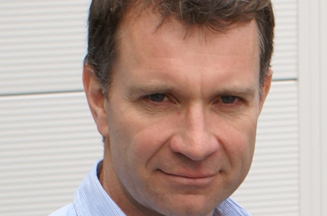
What do you do when Robert Peston pops onto your TV screen? Sit back, relax and enjoy his idiosyncratic delivery? Lean nervously forward, wondering how much lower your pension fund can sink? Hurl the cat at the TV screen? Pour another large glass of Shiraz (on special offer at Majestic)?
Certainly the last one, if recent reports of booming wine sales are right. And you might well agree that some more gleeful reporting about the downturn is adding to the lack of trust we Britons now have in our institutions, especially financial ones - a recent Guardian survey showed lower levels of trust in UK banks than pretty well anywhere else in the developed world.
Trust, of course, is the foundation of the entire economic system. When it goes, people stop believing their jobs are safe, so they stop spending. They stop thinking their money is safe, so they stop investing. They don't know whether inflation, property or interest rates are heading up or down. And that mindset pervades not just consumers but businesses too - resulting in the big freezeup we hear about on the TV news night after night.
What is interesting from a marketing point of view is not just the desperate need to restore trust, particularly in financial brands, as a crucial part of the economic recovery. It's that this crisis has crystallised a number of long-term trends which have been building up for the last decade - access to information through the web, consumer power, shrinking State provision, the feelings of wealth our inflated property values and easy credit have given us.
We know far more than we did, and we're far more used to being in control. And right now, the economy has gone from being just background noise to the top of our worry list according to IPSOS Mori. Every time we see Peston, read another article in the Sundays or look at another finance website we feel less in control. And when you don't feel in control, you feel less confident. And when you don't feel confident, you don't trust the brands and institutions that have made you feel that way - whether that's Northern Rock, Lehman, Madoff or an employer that has laid you off.
Taken together, that means we're no longer talking about something as trite (or relatively simple) as merely rebuilding trust. We're talking about reinventing trust from the ground up - for institutions as well as consumers. A revolution has happened, and the recent regulation changes from the FSA now begin to look like a rather late attempt to catch up. And there's a strong argument that says you can't regulate your way to trust, it has to be earned.
US President Obama has capitalised on the current urge for reinvention with his ‘change agenda'. And of course reinvention rewrites all the rules. New market entrants have an opportunity to sweep away the fallen giants; the giants (maybe) have a once in a lifetime chance to reboot themselves. Those that don't will be the British Leylands of the future. Business brands simply must reinvent themselves around their customers - or die.
Maybe it's time - like in Obama's acceptance speech - to recognise that the terms of connection and communications have been irrevocably inverted, and the task at hand is to find new ways to talk about the relationship between businesses, and between businesses and people. Lloyds TSB (pre-merger) had the highest trust rating of UK high street banks, and there's a lot for other financial brands (institutional as well as consumer) to learn from their approach.
Reinventing trust has to mean using new channels and new tools, new ways of engaging with audiences at a personal level. The internet-age values of openness and shared information have to be embraced, providers and intermediaries alike need to move from selling products to delivering a service, in a way that give control, confidence and therefore trust to customers - whether they are consumers or other businesses.
Further, if trust is so valuable, what about making it someone's job - is having a Chief Trust Officer so ridiculous? Can audiences be segmented by trust, rather than monetary value? And why can't trust (once reinvented) become a key competitive advantage? Being the first in any sector to win lost trust would surely provide a massive marketing boost.
The American essayist Ralph Waldo Emerson once said ‘Our distrust is very expensive.' Reinventing trust - especially in the financial sector - won't be cheap. But it could offer a much better return than some of the alternatives.

